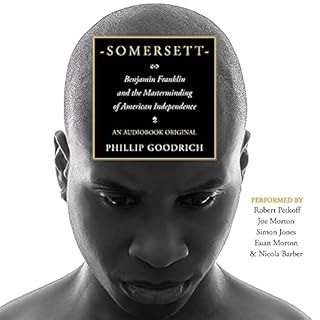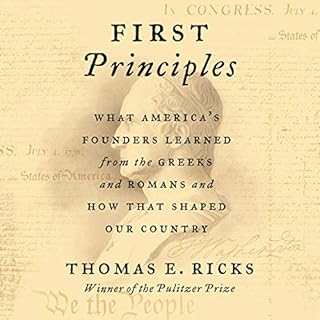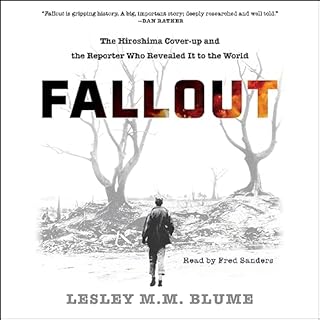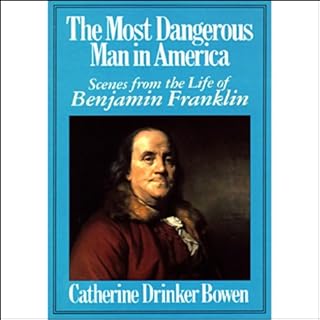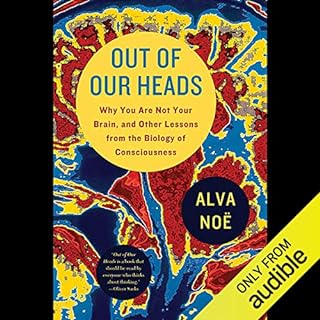Keith Pyne-Howarth
- 13
- reviews
- 5
- helpful votes
- 75
- ratings
-
Somersett
- Benjamin Franklin and the Masterminding of American Independence
- By: Phillip Goodrich
- Narrated by: Robert Petkoff, Joe Morton, Simon Jones, and others
- Length: 13 hrs and 42 mins
- Unabridged
-
Overall4.5 out of 5 stars 49
-
Performance4.5 out of 5 stars 45
-
Story4.5 out of 5 stars 44
In this under-reported and under-taught story of the American Revolution, light is shed on the little-known role Benjamin Franklin played in bringing the Northern and Southern colonies together against corrupt British rule. Along with an “Inner Circle” of British Abolitionists, Franklin worked behind the scenes to help free one American slave, James Somersett; and then, in cooperation with a vast network of colonial allies, set in motion a series of events that provided the impetus for Northern patriots and reluctant Southern slaveholders to join forces.
-
5 out of 5 stars
-
Wealth of History
- By H. Franke on 05-31-22
- Somersett
- Benjamin Franklin and the Masterminding of American Independence
- By: Phillip Goodrich
- Narrated by: Robert Petkoff, Joe Morton, Simon Jones, Euan Morton, Nicola Barber
The most disruptive history of Benjamin Franklin in 50 years. A MUST READ.
Reviewed: 10-26-23
If Somersett is to believed, much of the established scholarship regarding Benjamin Franklin is plagued by superficiality and faulty conclusions. Some of Franklin’s most distinguished biographers will find this book a direct challenge, while other revolve in their graves, either from discontent or embarrassment. We’ve long been told that Franklin was utterly dedicated to preserving unity between the colonies and the crown up until the pivotal attack he suffered in the cockpit after the Hutchinson letter affair and the Boston tea party, where he is said to have undergone a revolutionary,conversion. We’ve similarly learned that Franklin was no political philosopher, and had but the relatively average interest in political systems shared with most of his peers.
This book throws all of that away. It claims Franklin not only committed himself to the separation far earlier, but was, in fact, working behind the scenes to bring that revolution to reality in a very deliberate, very clandestine effort to free Pennsylvania and her sister colonies from British control.
I will have to heavily fact check this book, but if even half of is accurate, our understanding of Benjamin Franklin must undergo a serious overhaul.
Something went wrong. Please try again in a few minutes.
You voted on this review!
You reported this review!
-
First Principles
- What America's Founders Learned from the Greeks and Romans and How That Shaped Our Country
- By: Thomas E. Ricks
- Narrated by: James Lurie
- Length: 11 hrs and 56 mins
- Unabridged
-
Overall4.5 out of 5 stars 710
-
Performance4.5 out of 5 stars 600
-
Story4.5 out of 5 stars 596
On the morning after the 2016 presidential election, Thomas Ricks awoke with a few questions on his mind: What kind of nation did we now have? Is it what was designed or intended by the nation's founders? Trying to get as close to the source as he could, Ricks decided to go back and read the philosophy and literature that shaped the founders' thinking, and the letters they wrote to each other debating these crucial works—among them the Iliad, Plutarch's Lives, and the works of Xenophon, Epicurus, Aristotle, Cato, and Cicero.
-
2 out of 5 stars
-
Excellent book, opinionated epilogue.
- By Noetic Seeker on 01-23-21
- First Principles
- What America's Founders Learned from the Greeks and Romans and How That Shaped Our Country
- By: Thomas E. Ricks
- Narrated by: James Lurie
Fresh, But Beset By Surprising Factual Error
Reviewed: 09-30-21
Ricks has a fresh take on his chosen four Founding Fathers, and provides at least the beginnings of an insight into their thinking as they helped craft a new national government. We need more of this, frankly, as it may help us understand how it’s gone wrong with our current state of befuddled, dangerous partisanship.
But it was a shock to hear him state that for all the Founders (except John Adams) the issue of “...slavery was treated as much as possible with a conspiracy of silence.”
This is completely wrong. Benjamin Franklin spent his last energies, as President of the Pennsylvania Abolitionist Society, fighting against slavery, and trying to have congress address it. As this is hardly an obscure fact, this error and omission has me questioning just how reliable this book actually is.
Something went wrong. Please try again in a few minutes.
You voted on this review!
You reported this review!
1 person found this helpful
-
A Neon Darkness
- The Bright Sessions, Book 2
- By: Lauren Shippen
- Narrated by: Charlie Ian
- Length: 10 hrs and 38 mins
- Unabridged
-
Overall4.5 out of 5 stars 103
-
Performance5 out of 5 stars 86
-
Story4.5 out of 5 stars 86
Robert Gorham always gets what he wants. But the power of persuasion is as potent a blessing as it is a curse. Robert is alone until a group of strangers who can do impossible things - produce flames without flint, conduct electricity with their hands, and see visions of the past - welcome him. They call themselves Unusuals, and they give Robert a new name, too: Damien. Finally, finally he belongs. As long as he can keep his power under control. But control is a sacrifice he might not be willing to make.
-
5 out of 5 stars
-
What do you want?
- By Stripeysox on 01-30-21
- A Neon Darkness
- The Bright Sessions, Book 2
- By: Lauren Shippen
- Narrated by: Charlie Ian
Occasionally Brilliant, Always Entertaining
Reviewed: 07-26-21
I chose this book simply because I enjoyed The Infinite Noise. However, until I came back to my Audible account to write this review, I’d not noticed the “subtitle” of A Neon Darkness (“ What if the villain of the your story is you?”) Consequently, I had what is probably a very different experience than those readers who began the novel with the expectation of taking the antagonists’ perspective. I saw Robert, the main character, as the protagonist, and only slowly began to feel the tug of the very problematic path he was taking. I kept hoping - actually expecting - this poor kid with his so very sad and tragic personal story to grow, to take responsibility, to display genuine empathy. And I kept wishing his friends would teach him, in those times they were arguing, how to respond to criticism. That if he would only stop reacting so defensively - like a child (or, actually, most of us too often) reacts, he would recognize the opportunity he had - a real family was right there for him. So I was strung along rather exquisitely all the way to the climax hoping, and expecting, the inevitable happy ending...which of course does not happen.
I have to say I feel bad for anyone who actually saw the teaser. Why on Earth did Shippen, or perhaps the publisher, forecast the whole plot and it’s so-compelling transformation right there on the cover? I say this from the perspective of knowing absolutely nothing about these novels other than having read the first in the series, so perhaps my naïveté was rare.
In all events, the novel does so much so well, it compelled me to deeper considerations many times. From pleasurable speculations on what having and using meta-abilities would feel like, to revisiting research I’d read regarding how people respond when they gain power (in the real world). Shippen has great skill in articulating the nuances of human interactions and mixing those universal experiences almost imperceptibly with cleverly written descriptions of supernatural experiences. And her ability to flush out her main character, an young adult with incredible power stuck at the emotional maturity of a selfish five-year-old, was as rich as it was chilling.
A Neon Darkness could, in fact, have been a home run, but for one of its villains, Isiah, who is present here only as a plot device, shoehorned in here and there to move the plot in a desired direction. It’s clunky, sometimes almost preposterous, how this (admittedly frightening) mystery man appears, twirls his mustache, vanishes, and then, in the end, serves his real purpose - as the final line that must not be crossed. In such a carefully written, thoughtful work, Isiah is an real oddity, both in how shallow and predictable he’s presented to us, and in the square-peg ways he’s deployed.
There are other quibbles - Blaze should have been flushed out more, for instance - but they are minor. The interior world of the main character is so rich, you’ll forget about the little things. This was a hugely entertaining book, and an intriguing and worthwhile follow on to the enchanting Infinite Noise. I can’t wait to read number three!
Something went wrong. Please try again in a few minutes.
You voted on this review!
You reported this review!
-
Fallout
- The Hiroshima Cover-Up and the Reporter Who Revealed It to the World
- By: Lesley M.M. Blume
- Narrated by: Fred Sanders
- Length: 6 hrs and 52 mins
- Unabridged
-
Overall4.5 out of 5 stars 276
-
Performance4.5 out of 5 stars 232
-
Story4.5 out of 5 stars 234
Just days after the United States decimated Hiroshima and Nagasaki with nuclear bombs, the Japanese surrendered unconditionally. But even before the surrender, the US government and military had begun a secret propaganda and information suppression campaign to hide the devastating nature of these experimental weapons. The cover-up intensified as Occupation forces closed the atomic cities to Allied reporters, preventing leaks about the horrific long-term effects of radiation that would kill thousands during the months after the blast.
-
5 out of 5 stars
-
Required reading (listening, too)!
- By Michael Griffin on 08-13-20
- Fallout
- The Hiroshima Cover-Up and the Reporter Who Revealed It to the World
- By: Lesley M.M. Blume
- Narrated by: Fred Sanders
Darkly Beautiful and Disturbingly Relevant
Reviewed: 01-11-21
Though well-versed in, and always learning more of U.S. History, I was unaware of elements of this story that, largely through the efforts of the subjects of this fine book, were common knowledge by the late 1940’s. But I was assured in high school and college that the nuclear attack on Hiroshima and Nagasaki were well-justified. I suppose that if I had been more astute, it could have occurred to me that the mere presence of those justifications indicated controversy as to their veracity. And I was unaware of the government effort to deceive the American public about the nature and extent of the havoc inflicted by nuclear weapons following their use in 1945. Apparently, the public learned their government lied to them, then they forgot, and taught their children nothing of this deception.
Today we are still surrounded by deception. Whether it's the obvious lies of a Donald Trump, or the more subtle - and therefore more permeating - lies proffered by the false promises of capitalism, we are all of us subjects of the whims of fabricated truth. All we can do is our best, of course, and in that sense, this book provides a certain sense of uplift, even justice. It augers the benefits of truth at a time when ever more people seem to need refuge from it. It serves as reinforcing the adages that there is no justice without truth, and that truth can set us free. Hatred, division, lassitude, corruption...all depend on lies. In this book, we see an instance when light was brought to bear, and the people responded.
We’ll never know whether further nuclear exchanges were forestalled thanks to the work referred to in Fallout. But we know we need journalists and truth tellers as much as ever. This book gave me hope that the truth will out, and a deep respect for the people who made it happen in 1946.
Something went wrong. Please try again in a few minutes.
You voted on this review!
You reported this review!
2 people found this helpful
-
Caste
- The Origins of Our Discontents
- By: Isabel Wilkerson
- Narrated by: Robin Miles
- Length: 15 hrs and 10 mins
- Unabridged
-
Overall5 out of 5 stars 20,710
-
Performance5 out of 5 stars 17,994
-
Story5 out of 5 stars 17,860
In this brilliant book, Isabel Wilkerson gives us a masterful portrait of an unseen phenomenon in America as she explores, through an immersive, deeply researched narrative and stories about real people, how America today and throughout its history has been shaped by a hidden caste system, a rigid hierarchy of human rankings. Beautifully written, original, and revealing, Caste: The Origins of Our Discontents is an eye-opening story of people and history, and a reexamination of what lies under the surface of ordinary lives and of American life today.
-
5 out of 5 stars
-
Brilliant, articulate, highly listenable.
- By GM on 08-05-20
- Caste
- The Origins of Our Discontents
- By: Isabel Wilkerson
- Narrated by: Robin Miles
Essential to understanding American - a revelat
Reviewed: 09-20-20
If understanding the truth about United States history, culture and society is important to you, you need to read Isabel Wilkerson's "Caste".
The book is nothing less than a revelation - though one that might not come all at once, as it has for so long operated beyond our awareness. You may not even agree, at first, with Wilkerson’s argument. I was highly skeptical, thinking caste was just another term for racism or class. And certainly, I thought it had nothing to do with America. But this book has convinced me. It reshaped how I perceive the world...re-framing my understanding of facts that had been all along available, finally drawing them together into one unwelcome, inescapable conclusion.
“Caste" does not elucidate an entire theory. It's more of an eclectic - and very compelling - mix of ethnography, history, sociology, and cultural anthropology - with a useful quantity of relevant statistics and a bit of biography - mixed together with great skill and care, to bring us along on a path, at length, towards seeing a larger, fundamental truth.
Something of a warning: Wilkerson, like a good movie director, shows us as much as she spells out for us. Or, at least, she shows us what we need to see, and helps us to gradually create a new framework for how to see it for what it is. But this is frequently an unpleasant and sometimes very upsetting experience. In several sections of the book, I needed to stop listening for a time by way of emotional recovery. But to understand, we need everything we're given here, and there is nothing gratuitous in the presentation.
What this book helped me see it that racism, while real, is not the central problem - not the sin driving all the destructive effects we see all around us. Racism isn't even what we think it is. Caste is the real problem. Or, as Wilkerson describes it, "Race is the skin, and caste is the bones." And this truth about a foundational character of the United States must become known. We can't address our problems when we do not understand what the problem actually is.
It’s very unfortunate that “Caste” has to compete with the horror show that has been 2020. By all rights, it should be at the top of every reading list, every talk show, and every podcast. And, actually, even when it has been featured (by, for instance, Ezra Klein or Chris Hayes), its centrality and urgency seems to have evaded the hosts. This is a tragic oversight, and I earnestly hope the book will sometime claim the attention we all need it to capture. Until we see caste for what it is, here and now, we are doomed to our repeating history.
Something went wrong. Please try again in a few minutes.
You voted on this review!
You reported this review!

-
A Companion to Benjamin Franklin
- By: David Waldstreicher
- Narrated by: Scott Thomsen
- Length: 25 hrs and 49 mins
- Unabridged
-
Overall5 out of 5 stars 2
-
Performance3.5 out of 5 stars 2
-
Story5 out of 5 stars 2
This companion provides a comprehensive survey of the life, work and legacy of Benjamin Franklin - the oldest, most distinctive, and multifaceted of the founders.
-
5 out of 5 stars
-
A Doorway to Professional Franklin Scholarship.
- By Keith Pyne-Howarth on 05-10-20
- A Companion to Benjamin Franklin
- By: David Waldstreicher
- Narrated by: Scott Thomsen
A Doorway to Professional Franklin Scholarship.
Reviewed: 05-10-20
If you have a strong interest in Benjamin Franklin, and should you begin to suspect you know everything, or at least, everything interesting, there is to know about him, read this book. Beyond movies and documentaries, beyond your formal American History classes, even beyond his finest biographers, A Companion to Benjamin Franklin opens a new world of Franklin scholarship, taking deeper dives into familiar territory, as well as presenting areas likely novel to most readers. Highly worthwhile, enthusiastically recommended, and unmissable for anyone interested in moving their personal education of Franklin, the colonial era, the American Revolution, or the Founding Fathers to the next level.
There are one or two rather more dry chapters, and, of course, some restating of material already widely known. Nothing, however, that should distract from an offering that is frequently so engaging, energizing, and even, occasionally, deeply exciting and fascinating,
My only actual complaint is with the narrator. This is not necessarily the easiest book to read aloud, I should grant. Yet it seems to me not too much to ask that fairly common terms ought not be so glaringly mispronounced. But that is only a distraction compared to the pervasive issues with emphasis and cadence. A book of some engagingly-written academic scholarship, “Companion” is full of long stretches with moderately complex sentence structures. So it’s a shame the narration so very, very often does not reflect much by way of (perhaps?) preparation or, less charitably, comprehension. It accordingly requires significant attention and effort to capture the thesis on offer, whizzing by as if on an upside-down roller coaster of deleterious timing, bizarre inflection choices, and misdirected emphasis so awkward as to, in effect, camouflage the meaning of whole paragraphs.
But this is a subjective complaint, and in any case should not be allowed to turn prospective readers away. This one flaw is little against so much insightful, entertaining and enriching information. Dive in and see for yourself.
Something went wrong. Please try again in a few minutes.
You voted on this review!
You reported this review!
-
The Common Good
- By: Robert B. Reich
- Narrated by: Robert B. Reich
- Length: 5 hrs and 12 mins
- Unabridged
-
Overall4.5 out of 5 stars 527
-
Performance4.5 out of 5 stars 461
-
Story4.5 out of 5 stars 449
Robert B. Reich makes a powerful case for the expansion of America’s moral imagination. Rooting his argument in common sense and everyday reality, he demonstrates that a common good constitutes the very essence of any society or nation. Societies, he says, undergo virtuous cycles that reinforce the common good as well as vicious cycles that undermine it, one of which America has been experiencing for the past five decades. This process can and must be reversed.
-
5 out of 5 stars
-
Edifying
- By Jean on 03-15-18
- The Common Good
- By: Robert B. Reich
- Narrated by: Robert B. Reich
Provides a framework for defending our democracy
Reviewed: 01-29-19
Reich again exceeds expectations by beautifully and succinctly providing a convincing explanation for what truly ails the United States, and what to do about it. This fine work gives us a clarifying lens by which we might examine ourselves, tools for deciphering and explaining the historical, political, economic and social currents driving our systems, and a down-to-earth, cross-partisan path large majorities of Americans can all agree is a way out of this evermore self-evident mess we're in. He rebuilds bridges of common understanding by defining the beliefs we've all, almost instinctively, understood to be foundational to the best of our history, but which we sense have been under attack for decades, and helps us to direct our energies not into blaming each other, but by together reaffirming our most critical goal: the recapitulation and reinvigoration of the common good.
Something went wrong. Please try again in a few minutes.
You voted on this review!
You reported this review!
-
The Most Dangerous Man in America
- By: Catherine Drinker Bowen
- Narrated by: Lois Betterton
- Length: 9 hrs and 50 mins
- Unabridged
-
Overall4 out of 5 stars 90
-
Performance4 out of 5 stars 73
-
Story4.5 out of 5 stars 72
There have been numerous biographies of Benjamin Franklin, including his own notorious autobiography. This is the most charming and captivating account of all. Every chapter is a bewitching gem, and Franklin lives and breathes on every page.
-
2 out of 5 stars
-
Did this need to be written?
- By Michael on 08-20-08
- The Most Dangerous Man in America
- By: Catherine Drinker Bowen
- Narrated by: Lois Betterton
A unique, highly engaging perspective spiced by bright, restrained opinion
Reviewed: 07-02-18
“The Most Dangerous Man in America” is not intended as a comprehensive Franklin Biography. Instead, Catherine Bowen selects episodes from his many experiences and enriches them with details I've found nowhere else, and in a manner steeped with acumen, warmth, and insight. It's worth stressing how different this approach is to the typical Franklin tome. Bowen seems possessed of a particularly exercised perception. She applies this many times though the chapters, breathing light and life into dusty yesterdays, saturating Franklin with a greater depth of personage, of relatable personality, than any other historian has quite managed to capture or convey.
Not every conclusion rings as unassailable. But the whole of her thesis and the great bulk of her insights widen the eye to the Great Man as few others have. The last few chapters and afterward are, in particular, riveting, illuminating, powerful, and deeply poignant. After reading “Dangerous” you won't see Franklin or his life and times in quite the same way again. It's just that good.
Catherine Bowen, author of The Most Dangerous Man in America, completed this book even she was dying, or so the editors inform us. Unfamiliar as her other work is to me, I can't speculate on whether or what effect her circumstances may have had on her authorship, but something unique and worthwhile was lost on her passing, and that quality is conveyed in nearly every sentence of this fine, and final, work.
Something went wrong. Please try again in a few minutes.
You voted on this review!
You reported this review!
2 people found this helpful
-
Out of Our Heads
- You Are Not Your Brain, and Other Lessons from the Biology of Consciousness
- By: Alva Noe
- Narrated by: Jay Snyder
- Length: 6 hrs and 54 mins
- Unabridged
-
Overall4 out of 5 stars 100
-
Performance4 out of 5 stars 51
-
Story4.5 out of 5 stars 51
Alva Noë is one of a new breed - part philosopher, part cognitive scientist, part neuroscientist - who are radically altering the study of consciousness by asking difficult questions and pointing out obvious flaws in the current science. In Out of Our Heads, he restates and reexamines the problem of consciousness, and then proposes a startling solution: Do away with the 200-year-old paradigm that places consciousness within the confines of the brain.
-
4 out of 5 stars
-
A bold, yet ultimately unsupported, hypothesis
- By Keith Pyne-Howarth on 01-17-10
- Out of Our Heads
- You Are Not Your Brain, and Other Lessons from the Biology of Consciousness
- By: Alva Noe
- Narrated by: Jay Snyder
A bold, yet ultimately unsupported, hypothesis
Reviewed: 01-17-10
A well-written, well narrated tome with an ambitious agenda, Out of Our Heads proposes a new "astonishing hypothesis" but falls well short of supporting it. The author explores a number of compelling and, in and of themselves, very worthwhile avenues of cognition research. Yet positioning these studies as evidence in support of his central claim is, in nearly every case, a highly dubious proposition, with most actually being non-sequiturs. Perhaps the theory of innate brain modules (for language, or faces, for instance) is, as the author contends, false. So what? Transposing this (potential) condition to the proposed consequent requires a logic that, despite several attempts, defies discovery. Worse, the author, in one instance, grossly overstates the rigidity and ambition of what he posits to be a competing hypothesis, then knocks down this straw man with embarrassing gusto. Few if any serious researchers claim that all physical reality is just an illusion, literally a construction of the human mind. Yet Noe confidently describe their positions thusly, an inaccurate and unjust simplification/distortion that should be called out. Finally, if the author wishes our assent, he really must stop using, with nauseating repetitiveness, rhetorically-nonsensical catch-phrases he apparently believes to be colloquialisms. Specifically, if I ever read or hear "the world shows up for us" again, I will simply scream. The narrator must have been, in the end, gouging out his eyes at seeing yet ANOTHER appearance of this babblephrase.
All that said, I gave this book 4 stars and mildly recommend it. Much of the content is devoted to fascinating and well-crafted accounts of a variety of brain phenomena and research, and those I thoroughly enjoyed.
Something went wrong. Please try again in a few minutes.
You voted on this review!
You reported this review!
21 people found this helpful
-
Why Beautiful People Have More Daughters
- By: Alan S. Miller, Satoshi Kanazawa
- Narrated by: Stephen Hoye
- Length: 6 hrs and 11 mins
- Unabridged
-
Overall4 out of 5 stars 487
-
Performance4 out of 5 stars 362
-
Story4 out of 5 stars 363
Contrary to conventional wisdom, our brains and bodies are hardwired to carry out an evolutionary mission that determines much of what we do, from life plans to everyday decisions. With an accessible tone and a healthy disregard for political correctness, this lively and eminently readable book popularizes the latest research in a cutting-edge field of study: one that turns much of what we thought we knew about human nature upside-down.
-
3 out of 5 stars
-
Not bad but didn't live up to the reviews
- By Ana Mohammed on 01-08-12
- Why Beautiful People Have More Daughters
- By: Alan S. Miller, Satoshi Kanazawa
- Narrated by: Stephen Hoye
Captivating, clever, and very well read
Reviewed: 12-14-09
An excellent introduction to evolutionary psychology. Well written, in terms both of clarity and style, and peppered with moments of robust humor and startling, albeit tentative, conclusions. The narrator is excellent, sounding well rehearsed (all too rare) and possessed of a delightful sense of humor, served very, very dry.
Worth mentioning as well, the dedication to the co-author was, at least for me, genuinely moving and memorable.
Something went wrong. Please try again in a few minutes.
You voted on this review!
You reported this review!
4 people found this helpful


